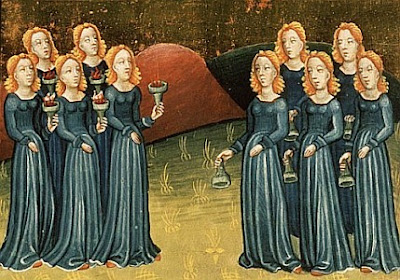First Reading (Genesis 15:1-6, 21:1-3)
The word of the LORD came to Abram in a vision, saying:
"Fear not, Abram!
I am your shield;
I will make your reward very great."
But Abram said,
"O Lord GOD, what good will your gifts be,
if I keep on being childless
and have as my heir the steward of my house, Eliezer?"
Abram continued,
"See, you have given me no offspring,
and so one of my servants will be my heir."
Then the word of the LORD came to him:
"No, that one shall not be your heir;
your own issue shall be your heir."
The Lord took Abram outside and said,
"Look up at the sky and count the stars, if you can.
Just so," he added, "shall your descendants be."
Abram put his faith in the LORD,
who credited it to him as an act of righteousness.
The LORD took note of Sarah as he had said he would;
he did for her as he had promised.
Sarah became pregnant and bore Abraham a son in his old age,
at the set time that God had stated.
Abraham gave the name Isaac to this son of his
whom Sarah bore him.
Asking the big questions: Is there anything that stuck out to you from this reading? How is God's promise to Abram fulfilled? How does God fulfill His promises in our lives?
Responsorial Pslam (Psalm 128:1-2, 3, 4-5)
R. (cf. 1) Blessed are those who fear the Lord and walk in his ways.
Blessed is everyone who fears the LORD,
who walks in his ways!
For you shall eat the fruit of your handiwork;
blessed shall you be, and favored.
R. Blessed are those who fear the Lord and walk in his ways.
Your wife shall be like a fruitful vine
in the recesses of your home;
your children like olive plants
around your table.
R. Blessed are those who fear the Lord and walk in his ways.
Behold, thus is the man blessed
who fears the LORD.
The LORD bless you from Zion:
may you see the prosperity of Jerusalem
all the days of your life.
R. Blessed are those who fear the Lord and walk in his ways.
Second Reading (Colossians 3:12-21)
Brothers and sisters:
Put on, as God's chosen ones, holy and beloved,
heartfelt compassion, kindness, humility, gentleness, and patience,
bearing with one another and forgiving one another,
if one has a grievance against another;
as the Lord has forgiven you, so must you also do.
And over all these put on love,
that is, the bond of perfection.
And let the peace of Christ control your hearts,
the peace into which you were also called in one body.
And be thankful.
Let the word of Christ dwell in you richly,
as in all wisdom you teach and admonish one another,
singing psalms, hymns, and spiritual songs
with gratitude in your hearts to God.
And whatever you do, in word or in deed,
do everything in the name of the Lord Jesus,
giving thanks to God the Father through him.
Wives, be subordinate to your husbands,
as is proper in the Lord.
Husbands, love your wives,
and avoid any bitterness toward them.
Children, obey your parents in everything,
for this is pleasing to the Lord.
Fathers, do not provoke your children,
so they may not become discouraged.
Gospel (Luke 2:22-40)
When the days were completed for their purification
according to the law of Moses,
They took him up to Jerusalem
to present him to the Lord,
just as it is written in the law of the Lord,
Every male that opens the womb shall be consecrated to the Lord,
and to offer the sacrifice of
a pair of turtledoves or two young pigeons,
in accordance with the dictate in the law of the Lord.
Now there was a man in Jerusalem whose name was Simeon.
This man was righteous and devout,
awaiting the consolation of Israel,
and the Holy Spirit was upon him.
It had been revealed to him by the Holy Spirit
that he should not see death
before he had seen the Christ of the Lord.
He came in the Spirit into the temple;
and when the parents brought in the child Jesus
to perform the custom of the law in regard to him,
He took him into his arms and blessed God, saying:
"Now, Master, you may let your servant go
in peace, according to your word,
for my eyes have seen your salvation,
which you prepared in sight of all the peoples,
a light for revelation to the Gentiles,
and glory for your people Israel."
The child's father and mother were amazed at what was said about him;
and Simeon blessed them and said to Mary his mother,
"Behold, this child is destined
for the fall and rise of many in Israel,
and to be a sign that will be contradicted
—and you yourself a sword will pierce—
so that the thoughts of many hearts may be revealed."
There was also a prophetess, Anna,
the daughter of Phanuel, of the tribe of Asher.
She was advanced in years,
having lived seven years with her husband after her marriage,
and then as a widow until she was eighty-four.
She never left the temple,
but worshiped night and day with fasting and prayer.
And coming forward at that very time,
she gave thanks to God and spoke about the child
to all who were awaiting the redemption of Jerusalem.
When they had fulfilled all the prescriptions
of the law of the Lord,
they returned to Galilee,
to their own town of Nazareth.
The child grew and became strong, filled with wisdom;
and the favor of God was upon him.














